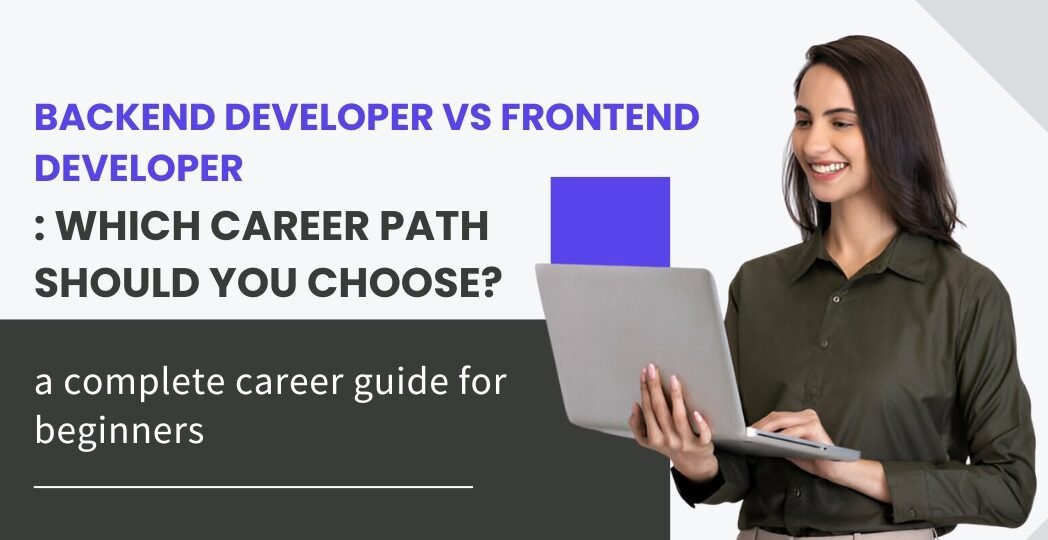Table of Contents
In today’s digital world, websites and apps are part of our daily life. From ordering food to booking tickets, everything happens online. But have you ever wondered—who creates these websites and apps? And more importantly, if you want to work in this field, should you be a backend developer or a frontend developer?
The question of Backend Developer vs Frontend Developer is one that many beginners face. Both roles are important, but they are very different in what they do, the skills they require, and the type of work you’ll be doing daily. In this article, we’ll explore both career paths in detail, so you’ll know exactly which one is right for you.
Understanding the Basics
Before you can choose, you need to know what each role does.
Frontend Developer – The frontend is the part of a website or app that you see and interact with. Everything from the colors, fonts, menus, and images to the way buttons respond when you click them is created by a frontend developer. They work with HTML, CSS, and JavaScript, and often use frameworks like React, Angular, or Vue.js. Their main goal is to make the site look good and work smoothly for users.
Backend Developer – The backend is like the engine of a car. You can’t see it, but without it, the car won’t run. Backend developers build and manage the server, database, and application logic. They work with languages like Python, Java, PHP, or Node.js, and focus on making sure the data is stored, retrieved, and processed correctly.
A simple way to remember: Frontend developers build the part you see. Backend developers build the part that makes it work.
The Main Differences: Backend Developer vs Frontend Developer
When comparing Backend Developer vs Frontend Developer, think about the type of work you enjoy.
- Visual vs Logical Work – If you enjoy design, layouts, and making things visually appealing, frontend might be for you. If you enjoy problem-solving, working with data, and making systems work, backend might be your path.
- User Interaction vs Behind the Scenes – Frontend developers deal directly with the user interface. Backend developers focus on what happens in the background.
- Tools and Languages – Frontend uses HTML, CSS, and JavaScript. Backend uses Python, Java, PHP, Ruby, and databases like MySQL or MongoDB.
Skills You Need
For Frontend Developers:
- HTML, CSS, JavaScript
- Responsive design (websites that look good on mobile, tablet, and desktop)
- Basic knowledge of APIs
- Understanding of user experience (UX)
For Backend Developers:
- Server-side languages like Python, Java, or PHP
- Database management (SQL or NoSQL)
- API creation and integration
- Security, performance, and scalability
Some skills are useful for both, such as version control (Git), problem-solving, and teamwork.
Which is Easier to Learn?
If you are completely new to coding, frontend development might feel easier to start with. You can see results quickly—like making a simple webpage in a few hours. Backend development can take more time to learn because it involves complex logic, databases, and server management.
However, this doesn’t mean backend is “too hard.” With structured learning, such as joining a Backend Developer Course, you can master backend skills step-by-step. These courses guide you through building APIs, connecting databases, and working on real-world projects, which is a huge help for beginners.
Career Opportunities
When thinking about Backend Developer vs Frontend Developer, you might also want to know which has better job opportunities. The truth is—both are in high demand.
Frontend Developer Careers:
- Work in web design companies, software firms, or as a freelancer.
- Demand is high in industries that rely on user-friendly apps and websites.
Backend Developer Careers:
- Work for startups, big tech companies, or as part of a development agency.
- Often get roles in industries that need strong data security and performance, like banking, healthcare, or e-commerce.
Salary Comparison
Salaries for frontend and backend developers are quite competitive. In many countries, backend developers earn slightly more because their work involves complex logic and system architecture. But the difference is not huge, and in some companies, frontend developers earn the same or even more.
Your salary will also depend on your skills, experience, and the technologies you know. For example, a backend developer who knows cloud computing and advanced databases may earn more than a frontend developer with basic HTML skills—and vice versa.
Should You Learn Both?
Many people start as either frontend or backend developers but later learn both. This makes them full-stack developers, meaning they can build both the visual and functional parts of a website. Full-stack developers are in high demand because they can handle projects from start to finish.
If you’re not sure which to choose, you could start with one and later expand your skills. For example, you could begin as a frontend developer and then take a Backend Developer Course to learn the other side.
How to Decide Which Career Path is Right for You
Here are a few tips to help you choose:
- Go for frontend if you love design, visuals, and immediate results.
- Go for backend if you enjoy problem-solving, working with data, and building systems.
- If you like both – consider becoming a full-stack developer.
You could also try small projects in both areas. Build a simple website (frontend) and then try connecting it to a database (backend). This will give you a taste of what each role feels like.
Final Thoughts
The Backend Developer vs Frontend Developer debate isn’t about which is better—it’s about what suits your interests and strengths. Both roles are equally important in building websites and apps.
If you enjoy making things look beautiful and easy to use, frontend could be your perfect match. If you like working on the “brain” of the application, backend might be the way to go. And if you want to be highly versatile, learning both is an excellent choice.
Remember, whichever you choose, continuous learning is key. And if backend is your path, enrolling in a Backend Developer Course can help you gain the skills and confidence you need to succeed.
Your career is a journey—start where you feel excited, and you can always grow into new areas later.







